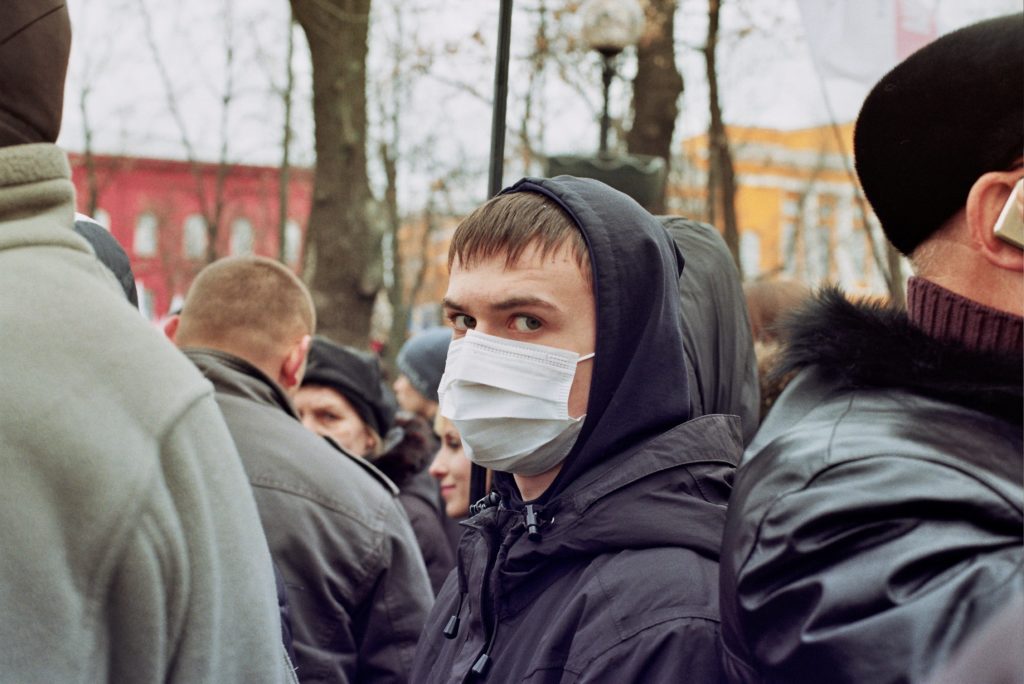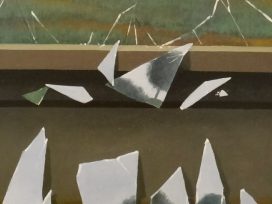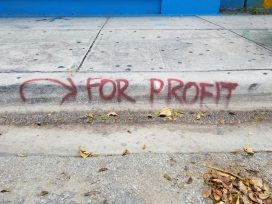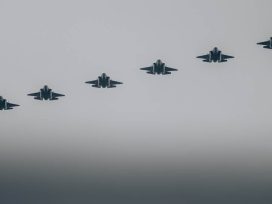Western commentators have lambasted Ukraine’s decision to ban Russian media, TV and film. But Mykola Riabchuk argues that attacking the move as censorship ignores its context: namely, Russia’s ongoing war against Ukraine.
Not long ago, the reputable Denmark-based international watchdog Freemuse, which monitors the freedom of artistic expression around the globe, published its annual report, titled ‘Art under threat’. One of the highlighted pieces from the report stated that ‘Ukraine in 2016 topped the list as the worst country to practise censorship, with 557 registered acts of censorship’.
If I had not lived in Ukraine for some sixty odd years and not learnt what real censorship meant since the early 1970s – being expelled from university for unauthorised publications and barred from any subsequent study or decent job – I probably would have bought the news at face value. Especially if I happened to read elsewhere that Ukraine is run by a fascist junta, which usurped power after a coup d’état and eviction of a ‘democratically elected president’. And moreover, that the Russian-speaking minority is oppressed and terrorised, and disobedient journalists are systematically killed, harassed and persecuted.
My experience, however, suggested that there were probably two very different Ukraines – the real one where I live and the virtual one where the Freemuse experts practise their bookkeeping skills in statistics and arithmetic, but hardly in algebra. Certainly, facts and figures make sense to help us understand something – the broader picture, a context or a trend. Yet, what does the figure ‘557 registered acts of censorship’ tell us about the country other than the undisputable fact that its artistic environment is far more restrictive than anybody else’s in the world? The second country on the list is Kuwait, with a modest 61 cases, and China comes next with 20. In contrast, Russia appears to be a true beacon of freedom – just 16 ‘registered acts of censorship’ even though it still loses to Iran (nine cases) and Saudi Arabia (a mere two).
The devil is in the detail
To their credit, the experts at Freemuse explain that Ukraine’s striking achievement is ‘mainly due to a blacklist of 544 films that were made public, mostly consisting of Russian films and TV-series banned as a result of the ongoing conflict between the two countries’. Therefore, ‘Ukraine alone accounted for 66 per cent of censorship cases in 2016 – 557 out of the total 840 cases registered.’
This explanation, however, raises several other questions. First, what does ‘blacklist’ mean in Ukraine and how does it differ – in scope and implementation – from what it means in Russia, China or Saudi Arabia? What happens to the culprits who violate the ban? Are they simply fined, imprisoned or shot dead? Does the ban only apply to commercial distribution or to personal consumption as well? These questions are not of little importance – as long as we try to understand the situation on the ground rather than perform sheer numerical exercises. True censorship, in repressive countries, is supported by secret police and prison sentences. It is embedded within draconian laws on ‘extremism’ (arbitrarily defined), ‘gay propaganda’ and ‘blasphemy’. Nothing of this kind exists in Ukraine today. Hence all that the spillover from the notorious ban of the poor 544 Russian films amounts to, in reality, is film distributors receiving a couple of official warnings.
Most likely, the average reader of Freemuse reports barely knows where Ukraine is on the map and is even less likely to know that Ukrainians have virtually unlimited access to Russian film, books, TV and music. There are no language barriers, no internet restrictions and, in most cases, no payment for streaming or downloading. The so-called ban on a few Russian films (as well as some music and books, omitted by Freemuse for unknown reasons) affects only distributors. It does not address the consumers – restricting only the commercial import of blacklisted items. Nowhere is there any mention of their import for personal use. In other words, anybody can bring up to ten copies of any book, CD or DVD from Russia as a personal belonging. They can even conveniently receive them by mail from Amazon or numerous other Russian online bookstores.
What is more, there has been no purge of blacklisted materials from public libraries. Hence, it is quite disputable whether we should really define the ban as censorship or merely a trade embargo against an enemy state. Simply put: Ukrainians are not significantly restricted in their access to those items, though the producers and promoters of those goods are restricted from making a profit in Ukraine on anti-Ukrainian products.
Sitting on the fence
Here is where we come to the main point: the Russo-Ukrainian war, which has taken the lives of more than 2,000 Ukrainian soldiers and 10,000 civilians, and displaced nearly two million people who have fled the violence. From a cosy and comfortable West European villa, the war may appear just an ‘ongoing conflict between two countries’. Yet, the closer to the frontline we move, and the more ruins and human suffering we see, the less appropriate such hypocritical terminology becomes. To describe Russia’s aggression against Ukraine as a sheer ‘conflict between two countries’ demeans the profound difference between the victim and the perpetrator, the bullied and the bully, the raped and the rapist. It is not just irresponsible, it is insulting.

Photographer: Ivan Bandura. Source: Flickr
Any censorship is deplorable and any restriction in the cultural field is regrettable. But it is not so clear how much a government should be allowed to curtail civil liberties and revoke entitlements (including the importation of various goods) during a war. The fact that Russia has not officially declared war on Ukraine does not make it less daunting, challenging or exhaustive. Within the past three years, Vladimir Putin’s Russia has effectively occupied Crimea, instigated an armed conflict in Donbas and pumped the region with mercenaries, money, advanced weaponry and regular troops. It has launched a powerful propaganda campaign, both domestically and internationally, to denigrate not just the Ukrainian government but the state in general. It has exerted a significant amount of energy to negate Ukraine’s identity, independence and historical legitimacy. Very few experts deny that Russia’s aggression poses an existential threat to Ukraine, but not all of them agree that a spade should be called a spade and that the war should be treated as such, however hybrid, covert or unconventional it might appear.
The decision seems unpalatable for many westerners, especially politicians, since it challenges their comfortable position on the fence and forces them to make what is essentially a moral choice. It immediately discredits all their talk about lifting sanctions from the rogue state for the sake of ‘mutually beneficial co-operation’. They prefer to call the Russo-Ukrainian war a ‘conflict’ or label the Russian intelligence-cum-military operation in Donbas a ‘civil war’ – forcefully packing the Russia-controlled region with its puppet government into Ukraine’s body in order to make the international conflict a purely domestic one. I still wonder whether the principled liberal experts would have so vigorously reprimanded the British or American governments for barring Nazi films from their theatres in the 1940s – just because they had some ‘conflict’ with Germany at that time.
Dunja Mijatović, the OSCE representative on media freedom, seems to be the most ardent (and most biased, as many Ukrainians believe) critic of Kyiv’s attempts to curb the Kremlin’s propaganda. As an impartial observer she should have certainly noticed that most people with press cards from the Russian side are journalists only in name. The Russian media systemically spread toxic lies and warmongering. In fact, this activity is much more indicative of special operations than journalism. Halya Coynash, an expert from the Kharkiv Human Rights Group, aptly remarks that during the war many self-regulatory mechanisms, so dear to liberal thought, fail to deliver. In particular, she contends that ‘the argument that deliberate propaganda can be combatted by pluralism of views ignores the fact that in all areas under militant or direct Russian control, pluralism is banned. It also fails to recognise the undoubted impact of lies on the vast majority of people who listen to “the news” and do not run to the internet or change channels in order to critically assess the information received. Mijatović places enormous emphasis on so-called “dialogue” between Ukrainian and Russian journalists, again ignoring the fact that Russian journalists working for state-controlled media produce what is required of them – or leave.’
Much rain from a small cloud
The recent reaction from some international watchdogs to Ukraine’s decision to remove the independent Russian TV channel Dozhd (Rain) from cable networks revealed not only a complete ignorance of the reality of war in the country, but also a lamentable inability to properly comment on it in a competent way. TV Rain was switched off after a number of warnings upon infringement of three clearly defined rules: firstly, the channel transmitted advertisements even though it was not entitled to do so (since Russia has never ratified the European Convention on Transfrontier Television); secondly, it repeatedly sent its journalists to Crimea directly from Russia, without Kyiv’s consent; and thirdly, it presented Crimea as part of Russia – quite an affront to Ukraine’s efforts to reclaim the occupied territories. The latter violation was probably the most serious and controversial, since many critics of Kyiv’s decision pointed to Russian law that criminalises any denial of Crimea belonging to Russia (the same law has already put a dozen Tatars and Ukrainians in prison). The argument, however, is dubious since it assumes that Russian laws should be strictly observed while the Ukrainian ones should not. In practical terms, TV Rain could have probably found a solution by completely avoiding the issue, but its managers’ belief in the non-mandatory character of Ukrainian law has apparently prevailed.
One may argue that Kyiv overreacted, since TV Rain in Ukraine was already marginal and its impact on society was negligible. Officially, it was accessible via cable to half a million viewers, though all of them also subscribed to a whole package of channels, among which TV Rain was certainly not the most popular (e.g. the largest Ukrainian cable TV provider Volya rated TV Rain 22nd on its list). The government in Kyiv, however, could not leave TV Rain unpunished, since it may have provoked a domino effect and encouraged further distorted coverage of Crimea’s status in other media forms, far beyond Russia. Besides, the station can easily be viewed online in Ukraine without any restrictions, like dozens of other allegedly banned Russian channels.
Remarkably, most international experts who lambasted Kyiv for its decision to shut down TV Rain simply ignored these details. They merely parroted standard phrases, like ‘deep concern’ that could be applied to any country – from China to Saudi Arabia – but had little to do with the Ukrainian reality, and provided virtually no hints to the outside observer on what all the fuss was about.
‘Ukraine should immediately cancel the order to ban broadcasts of the independent Russian broadcaster Dozhd,’ stated Nina Ognianova, co-ordinator for Europe and Central Asia at the Committee to Protect Journalists. ‘This ham-handed censorship will deprive Russian-speaking Ukrainian viewers of a counterpoint to Russian state-controlled media.’
‘The government ban of broadcasts by Dozhd is censorship that restricts Ukrainians’ access to a choice of viewpoints,’ said Robert Herman, the vice-president for international programs at Freedom House. ‘With Russian forces occupying part of Ukraine, it is vital that Ukrainians have access to independent coverage of the events in Russia and to one of the few remaining independent Russian media outlets.’
‘It is profoundly disappointing to see that the Ukrainian authorities are following the Kremlin’s example in silencing media they don’t like,’ added Tanya Cooper, a Ukraine researcher at Human Rights Watch. ‘The media should not be used as a scapegoat in political bargaining.’ And Mijatović tweeted that Kyiv’s decision would be ‘very damaging for media pluralism in Ukraine’.
None of the passionate speakers quoted above bothered to mention the legal grounds upon which TV Rain was switched off. Instead, they invented a story of ‘censorship’ where none existed, since its programmes contained nothing that Ukrainian authorities may specifically ‘dislike’, except of course the coverage of Crimea as a Russian territory. But this is hardly ‘censorship’; rather it is a matter of principles, international law and war-time imperatives.
The inattentive reader of all these statements would barely learn that the Ukrainian public has pretty good access to any information they need, including courageous investigative journalism at Hromadske TV, which the corrupt Ukrainian authorities may truly dislike and wish to silence. Ukrainians, with or without TV Rain, have good access to many viewpoints in the media and Russian-speakers can benefit from media pluralism in Ukraine as much as Ukrainian-speakers, since virtually all Ukrainian TV channels have bilingual programmes.
Ironically, Russian officials joined the chorus of Dozhd defenders – even though they effectively pushed away the channel from cable networks in Russia three years ago: ‘I hope that the Kyiv authorities have not sunk to such censorship. But if this information is true, we will inform the OSCE,’ wrote Maria Zakharova, the Russian foreign ministry spokeswoman, on Facebook.
In the meantime, even the most ardent Ukrainian critics of Petro Poroshenko’s government do not consider the removal of TV Rain as any kind of censorship. Tetyana Popova, a former Ukrainian deputy information policy minister who resigned last summer in protest over the government’s failure to investigate alleged abuses against journalists, recognised that Dozhd ‘unfortunately, broke the law’. Coynash expressed regret that ‘inaccurate [international] media coverage’ of the Dozhd story facilitated Moscow’s propaganda efforts to smear Ukraine and exaggerate the problems it really encounters.
Crying wolf
International watchdogs would have done a better job if they had given up conventional and, in some cases, very shallow rhetoric and paid more attention to the real problems on the ground. In Ukraine, it is certainly not the removal of TV Rain from cable. The primary problem is the disproportionately large role that a small group of very rich people – namely, the oligarchs – play in the media. On the one hand, this has ensured a sort of media pluralism throughout the years of Ukraine’s independence. On the other hand, it has hindered a firm institutionalisation of that pluralism under the rule of law, transparent media ownership and the strict observing of formal rules and laws. Freedom and liberty exist in Ukraine today despite the will of the ruling elite, not because of it. Civil society is the main agent of change and the main guarantor of its irreversibility. This requires protection and strong support that can be achieved primarily by strenuous institution-building.
The second problem stems from a general weakness, even dysfunctionality, of the Ukrainian state (certainly not a Leviathan, as Pavel Kazarin sardonically remarked in his comments on the alleged ban of Dozhd). This weakness, though harmful per se, is often used as an excuse for not only the inability but also an unwillingness to enforce the rule of law and bring perpetrators of various crimes to justice. In some cases, the inability might be quite real – as in the deadlocked investigation of the Pavlo Sheremet killing (some have speculated that Russian agents were behind the murder). In other cases, it is rather dubious – as in the failure to collect evidence against the alleged murder of the notorious Ukrainophobic blogger Oles Buzyna. Yet, in other cases it is purely scandalous – like the benign treatment that far-right extremists received after setting fire to a theatre as it screened a gay film; they were eventually qualified in court as mere ‘hooligans’ rather than criminals.
Ukraine is certainly not a place where freedom of speech and expression is firmly secured and where international watchdogs can take a break. Yet, it is a country that requires an astute awareness of the reality on the ground in order to give meaning to the facts and figures. Merely crying wolf is ridiculous. And unnecessarily crying wolf over and over again is irresponsible. At some point it may really come – and by then nobody will believe it is real.
Published 6 July 2017
Original in English
First published by New Eastern Europe May/August No 3-4 (XXVII)/2017
Contributed by New Eastern Europe © Mykola Riabchuk / New Eastern Europe / Eurozine
PDF/PRINTPublished in
In collaboration with
In focal points
Newsletter
Subscribe to know what’s worth thinking about.
Related Articles

House keys recur in the stories of Crimean Tatars and Palestinians displaced from their respective homelands in the 1940s, and Ukrainian citizens fleeing Russian invasion since 2014. Ethnographic research and discourses on art and justice show how objects emblematic of home salvage the history of exiled peoples from oblivion.

As capital consolidates, culture recedes, funding vanishes, access narrows. The question persists: why fund culture at all? Cultural managers from Austria, Hungary and Serbia discuss.






